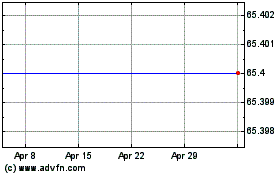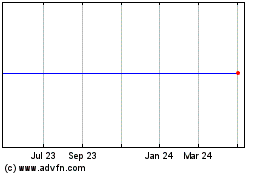By Matt Jarzemsky
KKR & Co. put two executives in line Monday to take over one
day for Henry Kravis and George Roberts, the private-equity
pioneers atop one of the biggest brands in finance.
The New York asset manager elevated Joe Bae and Scott Nuttall to
the roles of co-president and co-chief operating officer and added
them to its board, according to a statement Monday. In their new
roles, they will run KKR's day-to-day operations.
The appointments solidify the men's candidacies to one day run
KKR. There's no guarantee that either or both the men will end up
atop the firm, a person familiar with the matter cautioned.
KKR, founded in 1976, helped popularize debt-fueled corporate
takeovers known as leveraged buyouts. It earned a place in Wall
Street lore with deals such as the 1988 purchase of RJR Nabisco,
chronicled in the book "Barbarians at the Gate: The Fall of RJR
Nabisco."
But like its rivals, KKR has faced nagging questions over its
ability to endure a generational change. The top private-equity
firms rely on the track records, influence and mystique of their
founders to raise money and land deals, and many of the industry's
leaders have been reluctant to hand over the reins.
KKR has expanded dramatically in recent decades, though it has
lagged behind some rivals such as Blackstone Group LP and Apollo
Global Management LLC since the financial crisis in a race to
accumulate fee-generating assets. While KKR's stock has roughly
doubled since the company listed its shares in 2010, it has lagged
behind Blackstone's and the S&P 500.
Mr. Bae, a 45-year-old Korean-American deal maker, is well-known
in private-equity circles. A Harvard grad and Goldman Sachs alum,
he built an Asian investing operation that proved a bright spot for
KKR as the firm struggled with souring U.S. buyouts struck in the
run-up to the financial crisis. Its wins included the $1.8 billion
buyout and subsequent sale of Oriental Brewery to Anheuser-Busch
InBev NV in 2014, earning the firm five times its investment,
according to the person familiar with the matter. KKR last month
closed a $9.3 billion fund dedicated to buyouts in the Asia-Pacific
region, the largest such investment product focused on the
area.
Mr. Nuttall, 44, helps manage some of the activity KKR sees as
key to differentiating itself from an increasingly crowded field.
More than its peers, the firm has expanded into the lucrative
business of advising companies on raising debt and equity capital,
and put its own money into deals, a twist on the private-equity
model KKR's founders had a hand in creating.
A soft-spoken executive who previously worked at Blackstone
after graduating from the University of Pennsylvania, Mr. Nuttall
joined KKR as a private-equity investor. As time passed, his focus
shifted to building the firm's own business, helping it create
in-house debt-trading and hedge-fund units as KKR sought to
diversify beyond its private-equity roots.
He rose through the ranks while taking part in challenging deals
such as KKR's 2007 buyout of First Data. KKR has struggled to
unload its investment in the payment processor, whose business had
stumbled after it was saddled with debt that at one point totaled
more than $20 billion. Mr. Nuttall routinely speaks for the firm on
quarterly earnings conference calls and investor events.
In their new roles, Mr. Bae will lead KKR's efforts in
private-equity, infrastructure, real estate and energy investments,
while Mr. Nuttall will primarily oversee its businesses in
corporate debt, hedge funds and capital markets, and manage the
firm's own corporate development. Both men joined the firm in 1996,
and in recent years have been perceived as among the potential
front-runners to one day lead it.
Meanwhile, Alexander Navab, head of KKR's private-equity
business in the Americas, plans to depart the firm, according the
company's statement, which didn't provide further details.
Succession at KKR has been a subject of mounting interest inside
and outside the firm as its founders age. In recent years, Messrs.
Kravis and Roberts, 73-year-old cousins, had largely dismissed
questions about when they'll retire. They and some of their peers
have played active roles as their firms have grown from modest
investment partnerships to major asset managers. Many of the
largest such firms are still run by the men who started them.
Messrs. Kravis and Roberts will retain their roles as co-chief
executives and co-chairmen at KKR.
The pair formed KKR with Jerome Kohlberg, their colleague in the
corporate-finance division of Bear Stearns. In the following
decades, the company's fortunes traced the rise of private equity
and other so-called alternative investments, growing to manage $138
billion as of March 31.
Private-equity firms' growth has made the companies major
players on Wall Street and in the mainstream economy. The portfolio
companies of KKR's private-equity unit alone employed 995,000
people at year-end, according to the firm's website. Along the way,
KKR and Blackstone morphed into public companies themselves, as did
Apollo and Carlyle Group LP.
The industry's success also has bred competition. Blackstone,
the largest so-called alternative asset manager, has outpaced KKR
in building large businesses in real estate, corporate debt and
hedge funds. It had $368 billion in assets under management as of
March 31.
KKR and its rivals also face competition from scores of newer
entrants, some of which seek an edge by specializing in a
particular industry or region.
Private-equity firms have amassed growing sums of capital to
invest from pensions, sovereign-wealth funds and other major
investors seeking better returns. The firms have sometimes
struggled to put all the cash to work, a task made more difficult
as valuations in the stock market and elsewhere rise.
The industry's assets under management increased to a record
$2.49 trillion last year, and private-equity managers recently sat
on a record $820 billion in unspent capital, known as "dry
powder."
What also sets KKR apart from its rivals is the dozens of
capital-markets executives the company has hired to arrange debt
and equity financing for companies -- both those that it owns as
well as third parties. The group competes for fees with the
investment banks that also serve the firm, prompting occasional
grumbling from Wall Street bankers.
But KKR executives argue the division gives the firm's bottom
line a boost and helps it keep a finger on the pulse of the market.
KKR's capital-markets revenue rose to $121 million in the first
quarter, far exceeding the unit's previous quarterly high of $87.5
million.
The firm also uses its $13 billion balance sheet, the biggest
among its peers, to seed new businesses and strike unusually
structured deals that might otherwise be difficult for a
private-equity firm to complete. This year, for example, it used
its own money to team up with Canadian pension Caisse de dépôt et
placement du Québec for a roughly $2 billion purchase of insurance
broker USI Insurance Services.
Write to Matt Jarzemsky at matthew.jarzemsky@wsj.com
(END) Dow Jones Newswires
July 17, 2017 16:49 ET (20:49 GMT)
Copyright (c) 2017 Dow Jones & Company, Inc.
Reynolds (NYSE:RAI)
Historical Stock Chart
From Mar 2024 to Apr 2024

Reynolds (NYSE:RAI)
Historical Stock Chart
From Apr 2023 to Apr 2024
